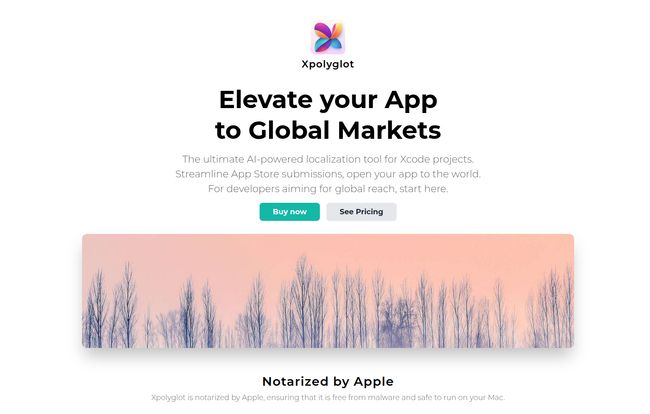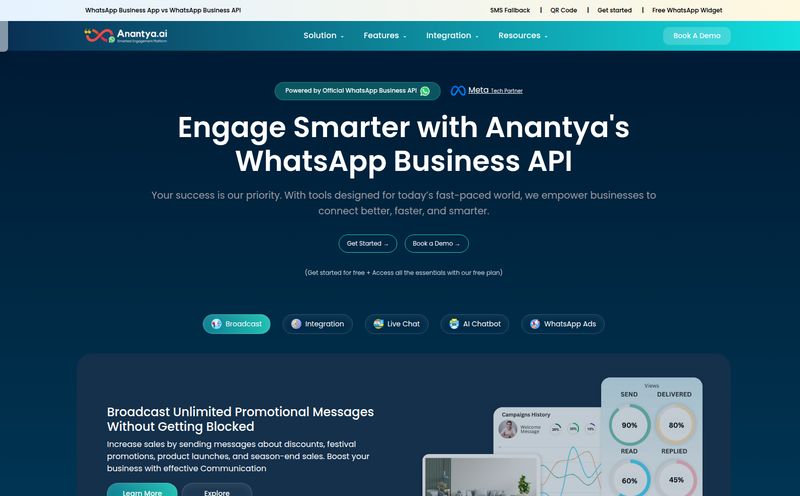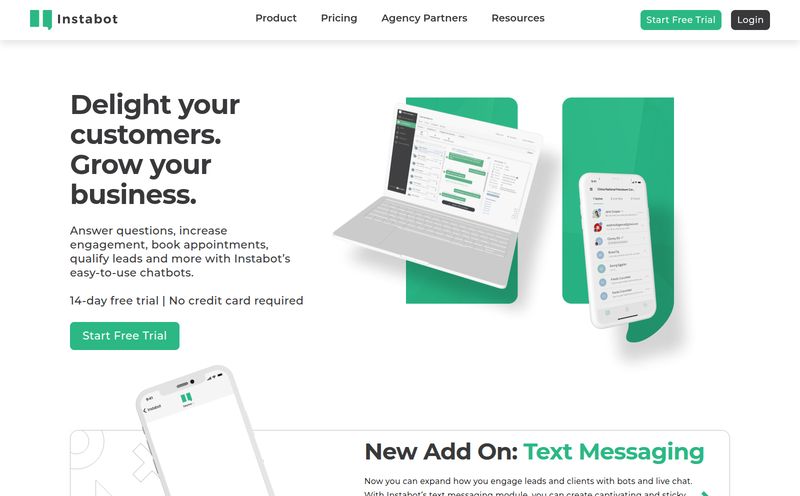Let’s talk about app localization. Ugh. Just the word itself probably makes some of you want to close this tab. I get it. For years, it’s been the final, soul-crushing boss battle of app development. You’ve spent months perfecting your code, polishing the UI, and squashing bugs. You’re ready to launch. And then you remember... you have to translate it. For every. Single. Market.
Suddenly you’re drowning in spreadsheets, emailing translators who live in different time zones, and copy-pasting `.strings` files until your fingers go numb. It’s a tedious, expensive, and error-prone mess. I’ve always felt it’s the part of the process that sucks all the creative joy out of shipping a project.
So, when a tool like Xpolyglot pops up on my radar, claiming to streamline this whole nightmare using AI, my interest is piqued. Is it just another half-baked solution, or is it the real deal? I decided to take a closer look.
What Exactly is Xpolyglot Anyway?
In a nutshell, Xpolyglot is a native macOS app built by a company called FiveSheep. It’s designed specifically for people in our little corner of the world: developers working with Xcode projects. Its whole purpose is to make localization less of a chore. It hooks directly into your Xcode project, pulls out all the text that needs translating, and then uses an AI model to do the heavy lifting.
It’s not just a simple translator, though. It’s built as a complete management tool for the entire localization workflow, from the first string to updating your App Store page. And as a Mac user, I have to say, seeing a tool that looks and feels like it belongs on macOS is a nice change of pace.
The Core Features That Actually Matter
A feature list is just a list. What matters is how those features solve real-world problems. After messing around with it, a few things really stood out.
Seamless Xcode Integration (No, Really)
This is the first hurdle where so many other tools stumble. They expect you to manually export and import files, which just adds another step to an already annoying process. Xpolyglot gets this right. You point it at your `.xcodeproj` or `.xcworkspace` file, and it just… works. It automatically finds your localizable strings and presents them in a clean, manageable interface. No more dragging files around like it's 2009. A small thing, but it shows they understand the developer's workflow.
AI-Powered Translations on a Budget
Okay, the main event. Xpolyglot uses AI for its translations. But here’s the interesting part: it doesn’t have its own built-in, proprietary AI. Instead, you have to provide your own OpenAI API key. At first, I was a bit hesitant about this. Another account to manage? But then it clicked. This approach keeps the tool's cost down and gives you control. You're paying for the AI usage directly, with no middleman markup.

Visit Xpolyglot
The app even includes a pretty slick savings estimator. You plug in the number of strings and words in your project, and it spits out a comparison between the estimated cost of human translation and the potential cost of using the OpenAI API. The difference is… stark. We’re talking about potentially hundreds or even thousands of dollars saved. For an indie developer or a small team, that's huge.
Taming the App Store Metadata Beast
If you've ever launched an app in multiple countries, you know the pain of App Store Connect. Translating your app's name, description, keywords, and release notes for every single language is a special kind of purgatory. Xpolyglot has a feature to globalize your metadata directly. You can connect it to your App Store Connect account, and it will handle the updates for you across all supported languages. This feature alone might be worth the price of admission. Seriously.
Delta Updates are the Unsung Hero
Here’s something I think is brilliant. Once you've done your initial translation, you're going to add new features. That means new strings. With traditional methods, you'd have to figure out what's new and send just that to your translator. Xpolyglot handles this automatically with 'delta updates'. It detects only the new or changed strings and translates just those. It’s a massive time-saver and, again, keeps your API costs to a minimum. It’s designed for how we actually build software: iteratively.
The Good, The Bad, and The AI-ish
No tool is perfect, right? So let's have a frank chat about where Xpolyglot shines and where it stumbles.
On the plus side, the convenience and cost-savings are undeniable. It takes a process that used to take days or weeks of coordination and condenses it into an afternoon. The interface is clean, the integration with Xcode is smooth, and the App Store metadata feature is a killer app in itself. It’s definitly a tool built by developers for developers.
However, let's be real about the downsides. The biggest one is the reliance on AI. AI translations have gotten incredibly good, but they are not flawless. For simple UI labels like "Save" or "Cancel," it's perfect. But for more nuanced marketing copy or complex sentences, you will absolutly want a native speaker to review its work. Think of it as the world's most efficient, multilingual intern. It gets the first 95% done, but you still need to be the editor-in-chief before shipping.
The other consideration is the OpenAI API key requirement. It’s an extra step and an extra bill to track. And of course, the tool is strictly for the Apple ecosystem. If you’re a macOS and iOS developer, great. If not, this isn't for you.
What's the Damage? A Look at Xpolyglot's Pricing
So, what does this all cost? Well, this is where things get a bit fuzzy. The website has a clear "Buy Now" button, suggesting a one-time purchase or subscription for the app itself. However, when I went looking for a dedicated pricing page to give you the exact numbers, I hit a 404 error. Whoops. It happens.
Based on the structure, it seems you'll have two separate costs: the price of the Xpolyglot app itself, and the variable, pay-as-you-go cost for your usage of the OpenAI API. It's important to factor both into your budget. Hopefully, the main pricing page gets fixed soon so we can see the exact cost of the app.
My Final Take: Is Xpolyglot Worth It for Developers?
After spending some time with it, here's my verdict. If you are an indie developer or part of a small team building apps for iOS or macOS, Xpolyglot feels like a no-brainer. The amount of time, money, and sheer frustration it saves is immense. Even if you still pay for a human proofreader, getting that first, comprehensive translation pass done in minutes instead of weeks fundamentally changes your release cycle.
If you're a large corporation with a dedicated localization department and established workflows, this might be too simple for your needs. But for the rest of us? For the lone dev trying to get their app out to a global audience without breaking the bank? Xpolyglot is a seriously compelling tool that solves a very real, very painful problem.
It’s not a magic button that removes all human oversight, but it’s a powerful step in the right direction. It automates the 90% of grunt work that bogs us down, freeing us up to focus on the final polish.
Frequently Asked Questions
- What is Xpolyglot?
- Xpolyglot is a macOS application designed to help app developers localize their Xcode projects. It uses AI to translate strings, manage projects, and update App Store metadata for multiple languages.
- Do I need a separate subscription for the AI?
- Yes. Xpolyglot requires you to have your own OpenAI account and API key. You are billed directly by OpenAI for the translation usage, which generally keeps costs lower than going through a third-party service.
- Is Xpolyglot available for Windows or Android development?
- No, not at this time. It is a native macOS application and is built specifically to integrate with Apple's Xcode development environment.
- How accurate are the AI translations?
- They are surprisingly good for most UI text and common phrases. However, for critical or nuanced content like marketing descriptions or complex instructions, it is highly recommended to have a native speaker review the translations for accuracy and cultural context.
- Can I manage multiple app projects in Xpolyglot?
- Yes, the user interface is designed to manage multiple projects at once. You can easily switch between your different Xcode projects from the main window.
Reference and Sources
- Xpolyglot Official Website
- FiveSheep - The developers of Xpolyglot
- OpenAI API Pricing - For estimating translation costs



